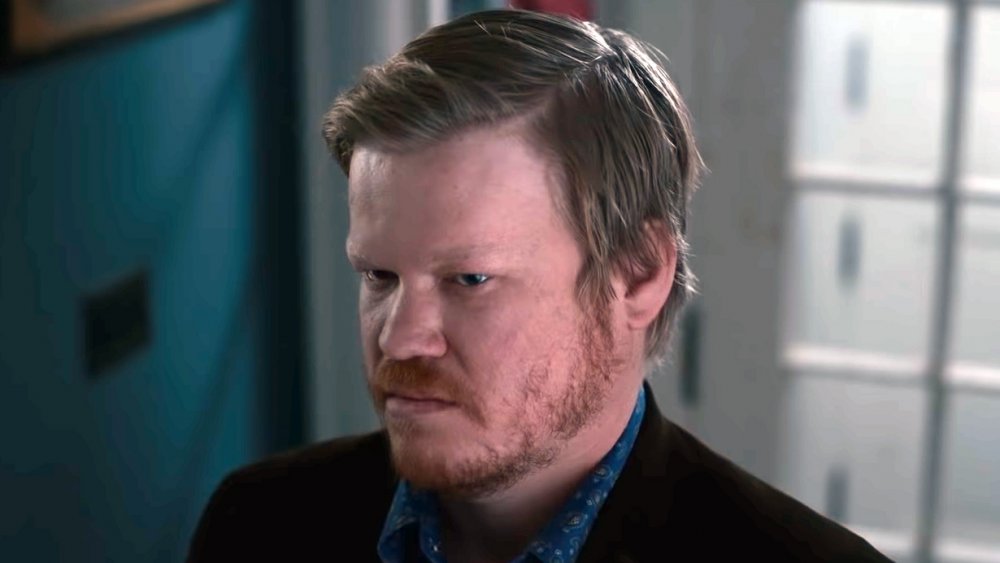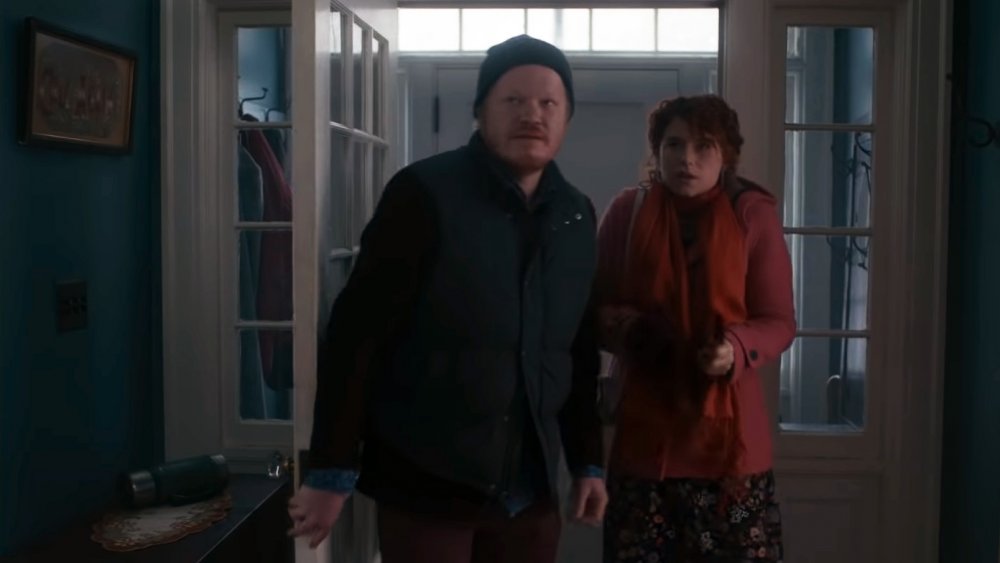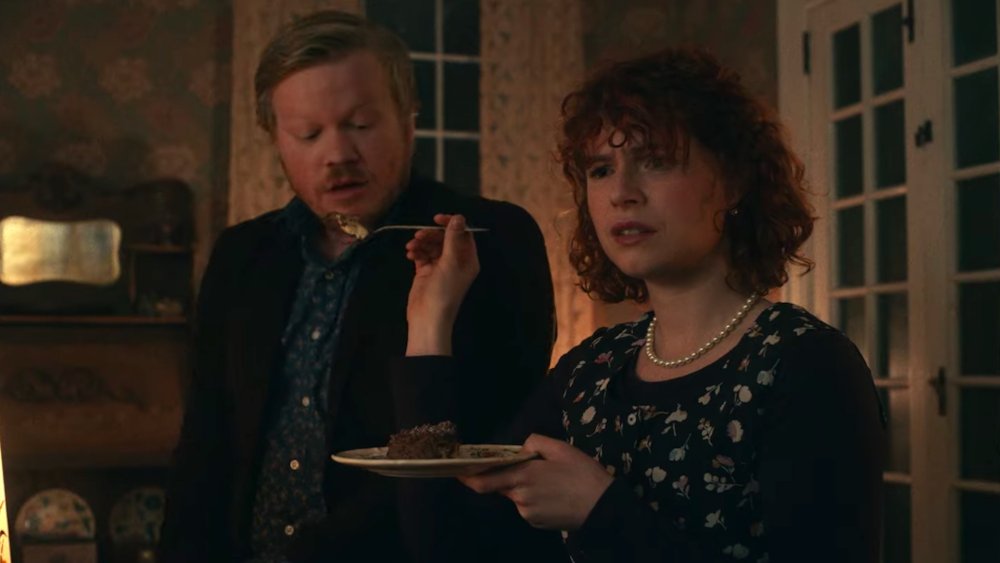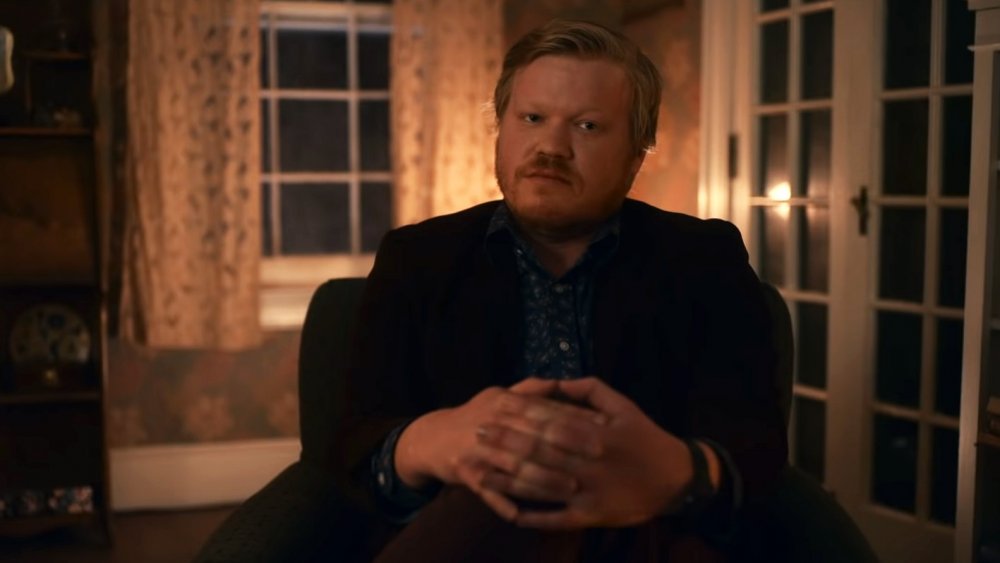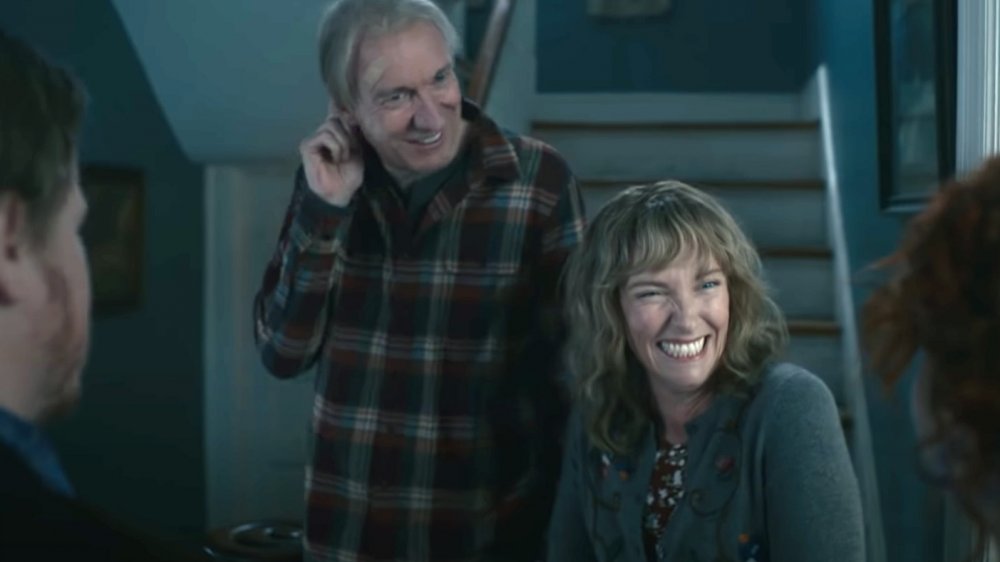The Scene In I'm Thinking Of Ending Things That Makes Us Love Jessie Plemons Even More
This content was paid for by Netflix and created by Looper.
I'm Thinking of Ending Things, the new film from Charlie Kaufman, shouldn't be so unsettling. Its premise certainly isn't. Jake, played by Jesse Plemons, travels to the farmhouse where he grew up and introduces his new girlfriend to his parents. That's it. Jake's not even a particularly menacing character. He memorizes poetry. He loves musicals. He reads David Foster Wallace. He's awkward, but in a way that's charming, not harmful.
And yet once Jake and his girlfriend reach the farm, things take a decidedly odd turn. Again, on the surface, everything is pretty normal. After a brief tour of the barn, Jake and his girlfriend sit in the living room, waiting for Jake's parents to come down from upstairs. Jake puts on some music and makes a fire. His girlfriend ponders various knickknacks scattered around the room. They make small talk. There's nothing inherently dangerous about it.
Not until Plemons works his magic, anyway. Jake's parents don't seem to be in a hurry to greet their son, and as he waits, Jake grows more and more agitated. At first, he just seems nervous. As more time passes, however, it's hard to shake the sense that something more sinister is going on. Despite the mundane setup, the tension in the room is almost tangible, and it all comes from Plemons' inspired performance.
That shouldn't come as much of a shock. Over the past few years, the Friday Night Lights, Fargo, and Black Mirror star has perfected this kind of role, and his turn in I'm Thinking of Ending Things may just be his best performance yet. Here's why.
It's his innate relatability
While Jesse Plemons has a few larger-than-life blockbusters on his filmography, he's best known for playing ordinary people (albeit often ones caught up in extraordinary circumstances). On Friday Night Lights, Plemons wasn't the star quarterback. He was the quarterback's best friend. In Fargo, he's a small-town butcher who wants nothing more than to buy the shop where he works. In Other People, he plays a man whose mother is dying of cancer. Onscreen, Plemons never feels like a movie star. He seems like a regular dude, which makes it very, very easy to sympathize with him.
That's true in I'm Thinking of Ending Things, too, at least at first. Jake's situation is all too relatable. Introducing a new partner to your parents is awkward, nerve-wracking, and extremely common, so it's easy to understand why Jake gets so fidgety as the scene goes on. While he begins the scene by gallantly offering his girlfriend his old slippers, it doesn't take long for anxiety to kick in. He keeps finding excuses to get off the couch. He can't stick to a single topic of conversation. He practically vibrates with nervous energy, which builds and builds and builds until it reaches a crescendo.
Jake's behavior is extreme. It's not, however, unjustified. Jake's reactions might be different than ours would be, but we know exactly what he's feeling. We've all been there.
It's his perfectly calibrated awkwardness
Relatable doesn't mean generic, of course. Jake is a very specific and unique character, with plenty of quirks of his own. Again, this is something that Plemons excels at. His best moment in the Breaking Bad spinoff movie, El Camino — you know, when Plemons sings "Sharing the Night Together" and gestures at a passing truck to honk its horn, all while carrying a body in his trunk — is one he improvised himself. In his biggest scene in The Irishman, he's busy explaining why his car smells like fish to a bunch of hardened gangsters.
This scene in I'm Thinking of Ending Things has lots of the same energy. It's there in the way Jake lurks at the bottom of the stairs, almost like a dog waiting for its master. It's in his awkward attempts at making a joke (in Latin, no less). It's there in his constant reassurances to his girlfriend that his parents will be right down. At one point, he even interrupts her — when she begins talking about marriage, notably — leaping to his feet and exclaiming, "Here they come!" A long, awkward beat follows. No one comes down the stairs.
It's actually a pretty funny moment, and wouldn't be out of place in a cringe-driven sitcom like The Office. Here, though, these little oddities serve a different purpose. One of Plemons' greatest strengths as an actor is his ability to convey so much through his body language, and in this scene it's very clear that what Jake's experiencing is very different from what he's saying. His voice never loses a friendly, good-natured tone, but he's clearly ill at ease, which comes into play when the other shoe drops.
It's his sinister affability
Plemons is very good at playing common people. He's even better at playing common people who, despite their unassuming veneers, hide dark secrets. His El Camino character, Todd Alquist, is introduced as a quiet man and a hard worker. He turns out to be a child-killing sociopath. In the Black Mirror episode "USS Callister," Plemons plays an awkward programmer who's belittled at work, and who takes out his frustrations on VR recreations of his co-workers. On Fargo, that small-town butcher uses a meat grinder to dispose of a dead body. In Game Night, Plemons' socially challenged cop ends up staging a kidnapping.
So when I'm Thinking of Ending Things take a turn towards the weird, it's not entirely unexpected. Eventually, Jake's girlfriend notices the door to the farmhouse's basement, which is covered with scratches and taped shut. Jake does not want to talk about it. First, he dismisses the basement as a "hole in the ground." Then he admits it scared him as a child. It's pretty ominous. It gets worse.
Eventually, the girlfriend compares the basement to something out of a horror movie. Jake laughs nervously. "He's hiding in there," Jake says, but won't explain who. When his girlfriend playfully tries to push past Jake and get to the door, Jake blocks her path. When she points out the scratches on the door, he blames a dog we've never met (and when we do, it sure doesn't act like a normal dog).
As a result, it's hard to shake the idea that Jake is hiding something, especially given Plemons' history with this kind of character. Jake doesn't even need to really do anything to make both his girlfriend and the audience uneasy. Because of Plemons' performance and his past roles, the mere suggestion of something else going on is enough to shift the tone from awkward comedy to real horror.
It's his underlying sadness
Jake's parents do eventually show up, of course, and boy, do they make an impression. As played by Toni Collette and David Thewlis, Jake's mother and father are significantly weirder than their son — and, given how odd Jake is, that's saying quite a bit.
Collette and Thewlis make a big impression at the end of this scene, but don't take your eyes off Plemons. As soon as Jake's parents arrive, his body language completely changes. Where Jake was fidgety and slightly panicked, he now stands completely still. He pulls away when his mother goes in for a hug. He shares a stiff, awkward handshake with his father, who doesn't look him in the eye. When it's time to eat, he heads straight for the dining room, not even bothering to stay for the conclusion of his dad's off-color joke.
Before, Jake seemed downright giddy about introducing his girlfriend to his folks. Now, he's quiet. It's profoundly sad. Earlier, Jake's offhand cracks about the farmhouse or his quip about happy families landed like jokes, or maybe some false modesty. Combined with the way Jake interacts with his parents, however, a much more somber portrait of Jake's childhood emerges, one that goes a long way toward explaining how Jake ended up the person that he is.
Again, this kind of loneliness is something that many of Plemons' characters share. In Fargo, Ed Blumquist struggles to relate to his flighty wife. Black Mirror's Robert Daly is reacting to the abuse he suffers at work. Game Night's Gary really just wants to hang out with his friends.
Ultimately, it's hard not to feel bad for Jake, even if we're still not sure we can trust him. This, in a nutshell, is what Plemons does so well: He creates memorable, sympathetic characters who we're drawn to in spite of their many obvious flaws. It's a delicate balancing act, but as this scene proves, it's one the actor performs perfectly.
